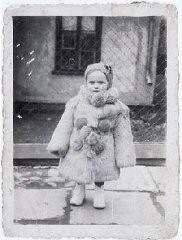<< Previous | Displaying results 476-500 of 2611 for "" | Next >>
-
Students and members of the SA unload materials for book burning
PhotoStudents and members of the SA unload books deemed "un-German" during the book burning in Berlin. The banner reads: "German students march against the un-German spirit." Berlin, Germany, May 10, 1933.
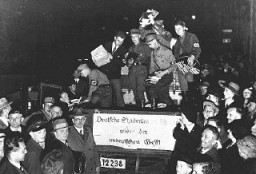
-
Students and members of the SA during the book burning in Berlin
PhotoStudents and members of the SA with armfuls of literature deemed "un-German" during the book burning in Berlin. Germany, May 10, 1933.
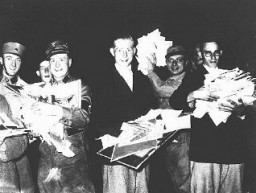
-
A book burning in Hamburg
PhotoIn Hamburg, members of the SA and students from the University of Hamburg burn books they regard as "un-German." Hamburg, Germany, May 15, 1933.
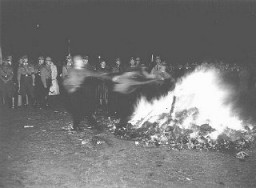
-
Book burning in Berlin
PhotoAt Berlin's Opernplatz (Opera Square), an SA man throws books into the flames at the public burning of books deemed "un-German." This image is a still from a motion picture. Berlin, Germany, May 10, 1933.
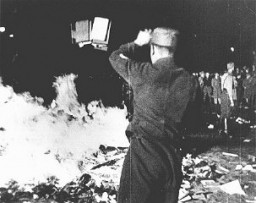
-
Public burning of "un-German" books in Berlin
PhotoPublic burning of "un-German" books in the Opernplatz (Opera Square) in Berlin. Students, some in SA uniform, march in a torchlight procession. Berlin, May 10, 1933.
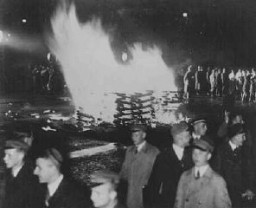
-
Joseph Goebbels speaks during book burning
PhotoJoseph Goebbels, German propaganda minister, speaks on the night of book burning. Berlin, Germany, May 10, 1933.
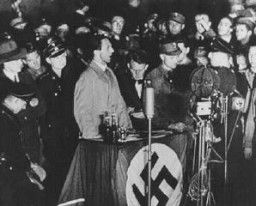
-
Propaganda Minister Joseph Goebbels speaks during the book burning
PhotoPropaganda Minister Joseph Goebbels (at podium) praises students and members of the SA for their efforts to destroy books deemed "un-German" during the book burning at Berlin's Opernplatz (opera square). Germany, May 10, 1933.

-
Gavra Mandil celebrates his fourth birthday
PhotoGavra Mandil celebrates his fourth birthday with his parents, Mosa and Gabriela, and sister Irena. Novi Sad, Yugoslavia, September 6, 1940.
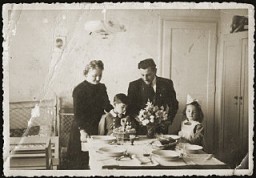
-
Yugoslav Jews in hiding
PhotoMr. Mandil and his son Gavra, Yugoslav Jews, while in hiding. The Mandil family escaped to Albania in 1942. After the German occupation in 1943, Mandil's Albanian apprentice hid the family, all of whom survived. Albania, between 1942 and 1945.
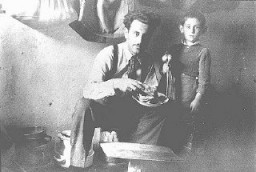
-
Sephardic synagogue in Berlin
PhotoAn interior view of the Sephardic synagogue on Luetzowstrasse. Berlin, Germany, before November 1938.
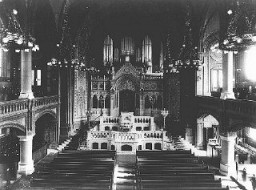
-
Bertolt Brecht
PhotoBertolt Brecht, author of the "Threepenny Opera" and a well-known leftist poet and dramatist, who emigrated from Germany in 1933. In exile, he co-edited an anti-Nazi magazine titled Das Wort. London, Great Britain, 1936.
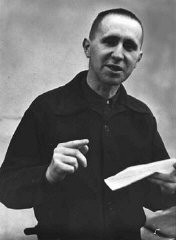
-
Bertolt Brecht
PhotoBertolt Brecht (left), Marxist poet and dramatist, was a staunch opponent of the Nazis. He fled Germany shortly after Hitler's rise to power. Pictured here with his son, Stefan. Germany, 1931.
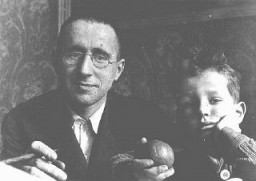
-
Lion Feuchtwanger in New York
PhotoAuthor Lion Feuchtwanger in New York, November 17, 1932. Feuchtwanger's 1930 novel Erfolg (Success) provided a thinly veiled criticism of the Beer Hall Putsch and Hitler's rise to leadership in the Nazi Party. He was targeted by the Nazis. After the Nazi takeover on January 30, 1933, his house in Berlin was illegally searched and his library was plundered during his lecture tour in the United States.
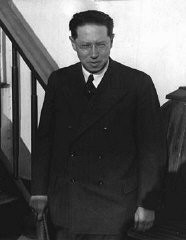
-
Lion Feuchtwanger arriving in New York
PhotoLion Feuchtwanger aboard the ship Excalibur, arriving in New York. United States, October 1940.
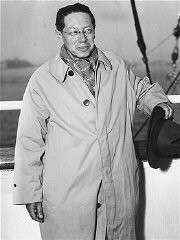
-
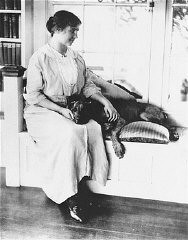
-
Helen Keller
PhotoPortrait of Helen Keller, ca. 1910. In 1933, Nazi students at more than 30 German universities pillaged libraries in search of books they considered to be "un-German." Among the literary and political writings they threw into the flames were the works of Helen Keller.
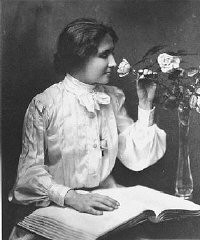
-
Portrait of Ernest Hemingway
PhotoErnest Hemingway in his World War I Red Cross Ambulance Corps uniform, ca. 1918.
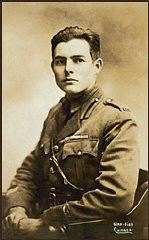
-
Ernest Hemingway
PhotoPortrait of Ernest Hemingway by Helen Pierce Breaker. Paris, France, ca. 1928. In 1933, Nazi students at more than 30 German universities pillaged libraries in search of books they considered to be "un-German." Among the literary and political writings they threw into the flames were the works of Ernest Hemingway.
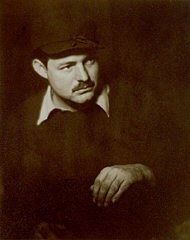
-
Cover of A Farewell to Arms
PhotoCover of Ernest Hemingway's A Farewell to Arms. (1929 cover. Princeton University Library.) In 1933, Nazi students at more than 30 German universities pillaged libraries in search of books they considered to be "un-German." Among the literary and political writings they threw into the flames during the book burning were the works of Ernest Hemingway.
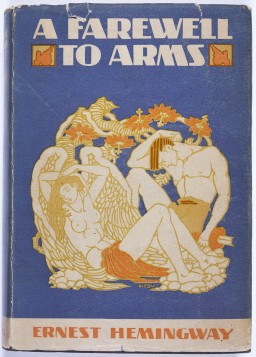
-
Hemingway on a safari
PhotoAmerican novelist Ernest Hemingway on safari, ca. 1933. In 1933, Nazi students at more than 30 German universities pillaged libraries in search of books they considered to be "un-German." Among the literary and political writings they threw into the flames were the works of Ernest Hemingway.
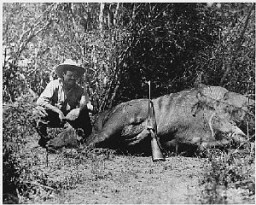
-
Ernest Hemingway
PhotoAuthor Ernest Hemingway aboard the boat Pilar, ca. 1950. In 1933, Nazi students at more than 30 German universities pillaged libraries in search of books they considered to be "un-German." Among the literary and political writings they threw into the flames were the works of Ernest Hemingway.
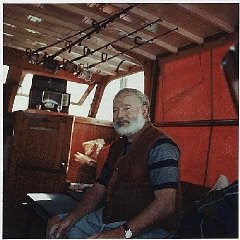
-
American novelist Ernest Hemingway
PhotoErnest Hemingway, among the greatest American novelists, was a member of the "Lost Generation" of expatriate writers who were disillusioned by war. In 1933 the Nazis burned Hemingway's novels as part of the public book burning in Berlin. United States, ca. 1950.
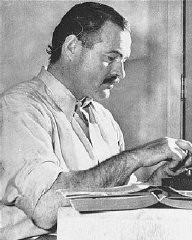
-
Hidden child Gitta Rosenzweig
PhotoDuring a roundup for deportation in eastern Poland in 1942, Gitta Rosenzweig—then three or four years old—was sent into hiding. She ended up in a Catholic orphanage. In 1946, Ida Rosenshtein, a family friend and a survivor, learned of the child's whereabouts and sought to claim her. After denying that it held a Jewish child, the orphanage relinquished custody after Ida recognized Gitta and a local Jewish committee paid a "redemption" fee. Gitta is pictured here on the day she left the orphanage.
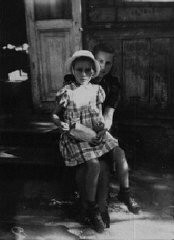
-
Portrait of Tsewie Herschel taken while he was living in hiding
PhotoPortrait of Tsewie Herschel seated in a chair, taken while he was living in hiding. Oosterbeek, the Netherlands, 1943–1944. Tsewie never knew his parents. Born in December 1942, he was hidden with the de Jong family in April 1943. That July, his parents were deported from the Netherlands to the Sobibór killing center. The de Jongs renamed Tsewie "Henkie," raised him as a Christian, and treated him as their son. Tsewie learned about his origins from his paternal grandmother, who reclaimed him…
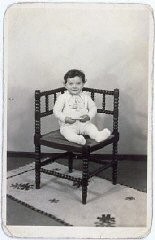
-
Portrait of three-year-old Estera Horn
PhotoPortrait of three-year-old Estera Horn wrapped in a fur coat. Chelm, Poland, ca. 1940. Estera was born in January 1937. Her father was killed soon after the Germans invaded Poland. Estera and her mother, Perla Horn, were forced into the ghetto in Chelm. At the end of 1942, during the liquidation of the ghetto, Perla and Estera escaped from the ghetto. They hid in nearby villages. In late 1943, Perla asked a family in Plawnice to take care of Estera. Perla tried to hide with a group of Jews in the nearby…
